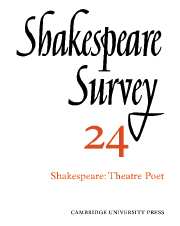Book contents
- Frontmatter
- Hearing Shakespeare: Sound and Meaning in ‘Antony and Cleopatra’
- ‘More Pregnantly Than Words’: Some Uses and Limitations of Visual Symbolism
- Shakespeare and the Limits of Language
- Revenge, Retribution, and Reconciliation
- Shakespeare the Professional
- Shakespeare’s Talking Animals
- The Morality of ‘Love’s Labour’s Lost’
- Shakespeare’s ‘Earth-treading Stars’: the Image of the Masque in ‘Romeo and Juliet’
- ‘Hamlet’ and the ‘Sparing Discoverie’
- ‘Hamlet’ in France 200 Years Ago
- The Hamlet in Henry Adams
- ‘Pericles’ and the Dream of Immortality
- A Necessary Theatre: The Royal Shakespeare Season 1970 Reviewed
- Free Shakespeare
- The Year's Contributions to Shakespearian Study 1 Critical Studies
- 2 Shakespeare’s Life, Times, and Stage
- 3 Textual Studies
- Index
- Plate section
Shakespeare’s Talking Animals
Published online by Cambridge University Press: 28 March 2007
- Frontmatter
- Hearing Shakespeare: Sound and Meaning in ‘Antony and Cleopatra’
- ‘More Pregnantly Than Words’: Some Uses and Limitations of Visual Symbolism
- Shakespeare and the Limits of Language
- Revenge, Retribution, and Reconciliation
- Shakespeare the Professional
- Shakespeare’s Talking Animals
- The Morality of ‘Love’s Labour’s Lost’
- Shakespeare’s ‘Earth-treading Stars’: the Image of the Masque in ‘Romeo and Juliet’
- ‘Hamlet’ and the ‘Sparing Discoverie’
- ‘Hamlet’ in France 200 Years Ago
- The Hamlet in Henry Adams
- ‘Pericles’ and the Dream of Immortality
- A Necessary Theatre: The Royal Shakespeare Season 1970 Reviewed
- Free Shakespeare
- The Year's Contributions to Shakespearian Study 1 Critical Studies
- 2 Shakespeare’s Life, Times, and Stage
- 3 Textual Studies
- Index
- Plate section
Summary
There is a tense moment at the end of certain modern dramatic productions (it is a feature which has recently shown itself at Stratford) when the actors suddenly turn on the audience and, in the name of communication, begin menacingly to advance on them with ferocious and implacable bonhomie. But let me put you out of fear. As this conference draws to an end, it is not my intention to come smilingly amongst you in any physical sense. I know my place. Nor does the title of my paper make mocking reference to any here present in their professional capacities. Dog does not eat dog.
But my subject does involve our communication with each other in a different, more general, but no less 'contemporary' way. For when Ben Jonson nominated language as' the only benefit man hath to expresse his excellencie of mind above other creatures' (Timber, or Discoveries), he was articulating an idea that has had modernity thrust upon it. In fact the concept of man as the Talking Animal, with language his distinctive feature, marking him off from the other animals, is one of those currently fashionable notions redeemed, we might now profitably allow, by its antiquity.
- Type
- Chapter
- Information
- Shakespeare Survey , pp. 47 - 54Publisher: Cambridge University PressPrint publication year: 1971
- 1
- Cited by

